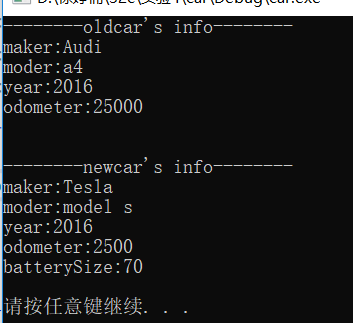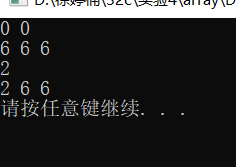1.Car

#ifndef BATTERY_H #define BATTERY_H class Battery{ public: Battery(int size = 70); int rebattery(); int batterySize; }; #endif

#ifndef CAR_H #define CAR_H #include<iostream> #include<string> using namespace std; class Car{ public: Car(string maker1,string model1,int year1,int odometer1=0):maker(maker1),model(model1),year(year1),odometer(odometer1){} friend ostream& operator<<(ostream &out, const Car &c); void updateOdometer(int o2); string maker, model; int year, odometer; }; #endif

#ifndef ELECTRICCAR_H #define ELECTRICCAR_H #include"battery.h" #include"car.h" #include<iostream> #include<string> class ElectricCar:public Car, public Battery { public: ElectricCar(string maker2,string model2,int year2,int odometer2=0,int size2=70):Car(maker2,model2,year2,odometer2),Battery(size2){} friend ostream& operator<<(ostream &outCar, const ElectricCar &e); void updateOdometer(int o2); }; #endif

#include"battery.h" Battery::Battery(int size) { batterySize = size; } int Battery::rebattery() { return batterySize; }

#include"car.h" #include<string> #include<iostream> using namespace std; ostream& operator<<(ostream &out, const Car &c) { out << "maker:" << c.maker << endl << "moder:" << c.model << endl << "year:" << c.year << endl << "odometer:" << c.odometer << endl; return out; } void Car::updateOdometer(int o2) { if (o2 < odometer) cout << "the number is wrong" << endl; else odometer = o2; }

#include"electricCar.h" #include"battery.h" #include"car.h" #include<iostream> using namespace std; ostream& operator<<(ostream &out, const ElectricCar &e) { out << "maker:" << e.maker << endl << "moder:" << e.model << endl << "year:" << e.year << endl << "odometer:" << e.odometer << endl << "batterySize:" << e.batterySize << endl; return out; } void ElectricCar::updateOdometer(int o2) { if (o2 < odometer) cout << "the number is wrong" << endl; else odometer = o2; }

#include <iostream> using namespace std; #include "car.h" #include "electricCar.h" int main() { // 测试Car类 Car oldcar("Audi", "a4", 2016); cout << "--------oldcar's info--------" << endl; oldcar.updateOdometer(25000); cout << oldcar << endl; // 测试ElectricCar类 ElectricCar newcar("Tesla", "model s", 2016); newcar.updateOdometer(2500); cout << "\n--------newcar's info--------\n"; cout << newcar << endl; system("pause"); return 0; }

2.Array

#ifndef ARRAY_INT_H #define ARRAY_INT_H class ArrayInt{ public: ArrayInt(int n, int value=0); ~ArrayInt(); // 补足:将运算符[]重载为成员函数的声明 int & operator[](int s); void print(); private: int *p; int size; }; #endif

#include "arrayInt.h" #include <iostream> #include <cstdlib> using std::cout; using std::endl; ArrayInt::ArrayInt(int n, int value): size(n) { p = new int[size]; if (p == nullptr) { cout << "fail to mallocate memory" << endl; exit(0); } for(int i=0; i<size; i++) p[i] = value; } ArrayInt::~ArrayInt() { delete[] p; } void ArrayInt::print() { for(int i=0; i<size; i++) cout << p[i] << " "; cout << endl; } // 补足:将运算符[]重载为成员函数的实现 // ××× int &ArrayInt::operator [](int s) { return p[s]; }

#include <iostream> using namespace std; #include "arrayInt.h" int main() { // 定义动态整型数组对象a,包含2个元素,初始值为0 ArrayInt a(2); a.print(); // 定义动态整型数组对象b,包含3个元素,初始值为6 ArrayInt b(3, 6); b.print(); // 通过对象名和下标方式访问并修改对象元素 b[0] = 2; cout << b[0] << endl; b.print(); system("pause"); return 0; }

总结:
1.第二个程序可以用添加现有项添加进去,但第一个程序添加进去后不能用,所以我第一个程序的main是复制黏贴进去的
2.做重载【】运算符的时候不能用private里面的变量,所以我把那些都定义在了public里面




